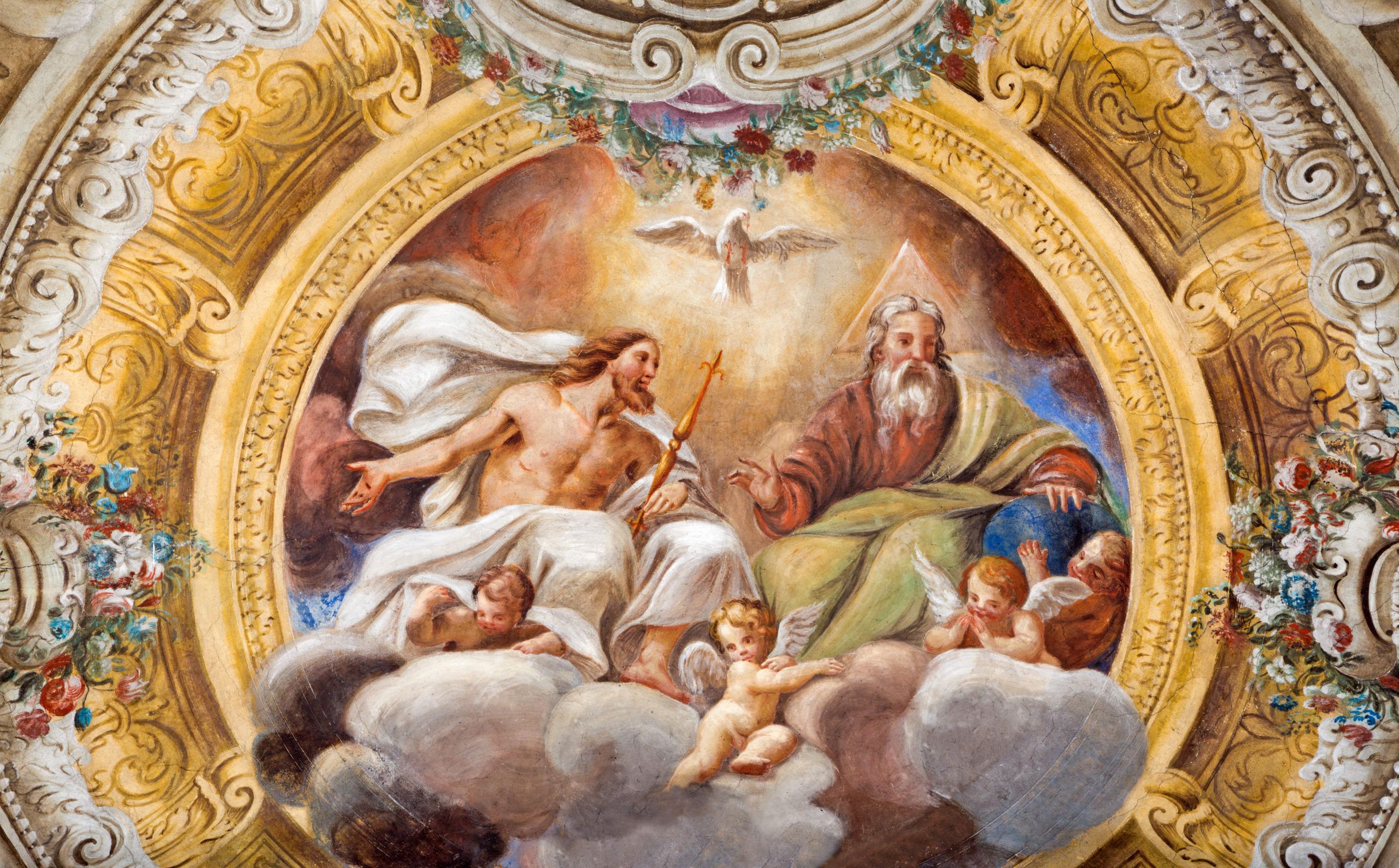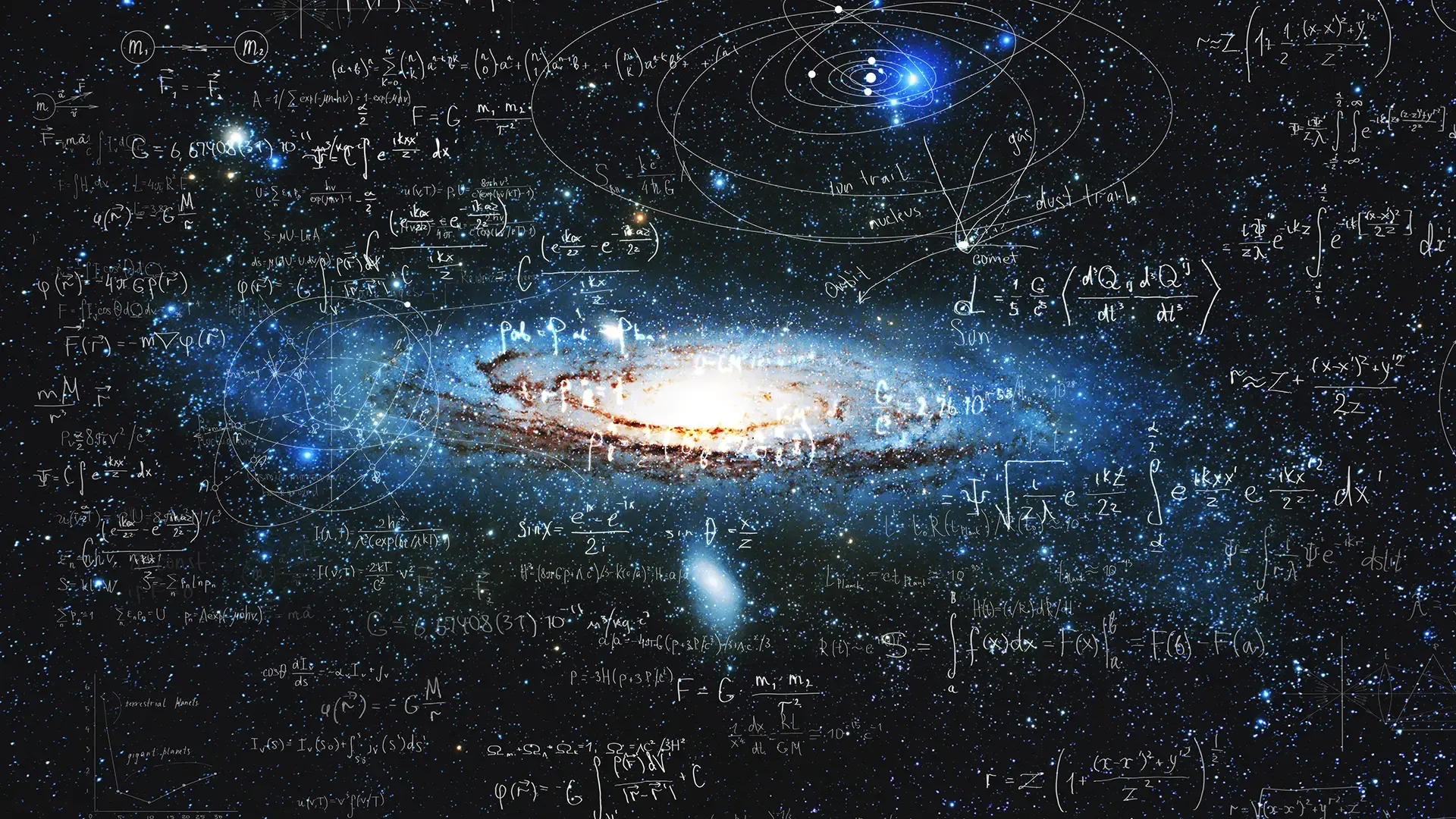The Trinity: Divining Our Multi-Dimensional Glorious God

An excerpt from Jewish Roots of Christianity by Larry Stamm – larrystamm.org
The Trinity in the Old Testament is a fascinating study, rather like studying a Rorschach test inkblot. Everyone perceives it differently.
God is a plurality—a multi-faceted, multi-dimensional being! Whatever our paradigm of God is, He is bigger. And whatever our understanding of God is, He is more complex.
You’ve perhaps heard it said that the Bible doesn’t tell us everything there is to know. It simply tells us everything we need to know. As God reveals Himself to us in the Holy Scriptures, we are introduced to a being much bigger and more complicated than we could even begin to fathom. With that said, the first words from God’s Word are illustrative.
As world-class biblical scholar Arnold Fruchtenbaum, a Jewish believer in Jesus, states in his enlightening article titled, “Jewishness and the Trinity,” “God is a plurality. It is generally agreed that the Hebrew word Elohim is a plural noun having the masculine plural ending “im.” The very word Elohim is used of the true God in Genesis 1:1, “In the beginning God created the heavens and the earth.”
Regarding plurality, Fruchtenbaum adds that in Hebrew grammar, the Lord will often refer to Himself using the plural pronoun. For example, Genesis 1:26 states, “… Then God (Elohim) said, ‘Let Us make man in Our image, according to Our likeness…’ ”
Here the Lord would not have been referring to angels since man was created in the image of God, and not of angels. Other biblical examples where we see the use of the plural pronoun are:
Genesis 3:22: “Then the Lord God [YHVH Elohim] said, ‘Behold, the man has become like one of Us’…”
Genesis 11:7: “Come, let Us go down, and there confuse their language…”
Isaiah 6:8: “Also I heard the voice of the Lord, saying, ‘Whom shall I send, and who will go for Us?’…”
GOD–A COMPOUND ONE
The greatest confession of faith in Judaism, called the Shema (meaning “hear”), is the declaration I sang often growing up in the synagogue: “Hear, O Israel: The LORD our God, the LORD is one!” (Deuteronomy 6:4).
Fruchtenbaum provides continuing perspective on this compound “one:”
Deuteronomy 6:4, known as the Shema, has always been Israel’s great confession. A glance through the Hebrew text where the word is used elsewhere can quickly show that the word does not mean an absolute “one,” but a compound “one.” For instance, in Genesis 1:5 the combination of evening and morning comprise one (echad) day. In Genesis 2:24 a man and a woman come together in marriage, and the two “shall become one [echad] flesh.”
Is God a Triune God? Yes!
If the Old Testament actually points to a plurality, then we might ask, “How many personalities exist in the Godhead?” As we’ll discover, there are clearly three distinct personalities in the Jewish scriptures that are ever considered divine.
THE FATHER
In the Old Testament there are numerous places where you’ll read the word “LORD”—this is considered in Judaism to be “Lord YHVH.” This is a reference to the Father. For example, Genesis 4:1-4 reads:
Now Adam knew Eve his wife, and she conceived and bore Cain, and said, “I have acquired a man from the LORD.” Then she bore again, this time his brother Abel. Now Abel was a keeper of sheep, but Cain was a tiller of the ground. And in the process of time it came to pass that Cain brought an offering of the fruit of the ground to the LORD. Abel also brought of the firstborn of his flock and of their fat. And the LORD respected Abel and his offering.
YHVH is called the tetragrammaton (meaning “four letters” in Greek); It’s derived from the verb that means “to be” and is considered in Judaism to be a proper name of the God of Israel used in the Hebrew Bible. It’s commonly pronounced “Yahweh,” though “Jehovah” is used in many bibles. Orthodox Jews are forbidden to say or write the tetragrammaton in full. Traditionally in Judaism, the name is not pronounced but read as “Adonai” (“Master” or “Lord”) during prayer, and referred to as “HaShem” (“The Name”) at all other times.
This reference to God, the Father, “LORD,” (all caps is the key) is used over 5,000 times in the Jewish scriptures and is by far the most common name for God in the Old Testament.
As a missionary to my Jewish people in New York City from 2003 to 2009, I had a Gospel witness to a few Orthodox Jewish men. While the origin of the prohibition against stating God’s name is unclear, many Orthodox Jewish people will not utter His proper name, “God.” Instead, they will simply refer to God as “the Name.” At one time in New York City, I regularly met with an Orthodox Jewish man named Isaac to share the truth claims of Jesus to be the Messiah. Usually upon our initial salutations, Isaac would shake my hand and endearingly exclaim, “Baruch HaShem”—meaning “Blessed be the Name.” This was one of the ways he expressed praise without uttering “God.”
THE SON
In the Hebrew scriptures, the Old Testament, a second personality is referred to either as “Son” or “the Angel of the Lord.”
As an example, Daniel 7:13 states, “I was watching in the night visions, And behold, One like the Son of Man, Coming with the clouds of heaven! He came to the Ancient of Days, And they brought Him near before Him.”
Jesus often referred to Himself as the “Son of Man.” In fact, the Lord referred to Himself as the “Son of Man” more often than any other self-designation in the Gospels. For example, in Matthew 12:8, Jesus said, “For the Son of Man is Lord even of the Sabbath.” In Mark 10:45, He announced, “For even the Son of Man did not come to be served, but to serve, and to give His life a ransom for many.”
Note the reference to the “Son” in Proverbs 30:4. This time in a specific question about the Son of God, “Who has ascended into heaven, or descended? Who has gathered the wind in His fists? Who has bound the waters in a garment? Who has established all the ends of the earth? What is His name, and what is His Son’s name, If you know?”
I personally love this verse and have used it on occasion in witnessing encounters with my Jewish people, because as you might imagine, the “Son of God” has no place in Judaism!
In Isaiah 9:6-7, we find a powerful passage that reveals a son who is characterized by divinity:
For unto us a Child is born, Unto us a Son is given; And the government will be upon His shoulder. And His name will be called Wonderful, Counselor, Mighty God, Everlasting Father, Prince of Peace. Of the increase of His government and peace There will be no end, Upon the throne of David and over His kingdom, To order it and establish it with judgment and justice From that time forward, even forever. The zeal of the LORD of hosts will perform this.
This compelling prophecy about Messiah contains several elements revealing His deity. First of all, this child who is born, this Son who is given, will be called “Mighty God” and “Everlasting Father.” That’s pretty clear. A child, a son, who is given these monikers? Sounds compelling, doesn’t it?
Additionally, note that His government will be eternal, as verse 7 declares, “Of the increase of His government and peace There will be no end, Upon the throne of David and over His kingdom, To order it and establish it with judgment and justice From that time forward, even forever…” There is only one government that is eternal—God’s—and the One Who will sit on the throne of David forever? That would be the King of Kings, Jesus, the Messiah (Revelation 17:14, 19:16)!
The exact identity of the “Angel of the Lord” in the Old Testament is not given, although many Bible scholars and theologians will describe His appearance as theophanies, or pre-incarnate manifestations of Jesus Christ. This individual is always seen as unique and distinct from all other angels. There are several places where He is referred to as both the “Angel of the LORD” and the “LORD” Himself. In the case of Manoah and his wife, the parents of Samson, which we’ll soon see, they will testify from their perspective as to the exact identity of the Angel of the Lord.
One Bible commentator puts it well: “The angel of the Lord speaks as God, identifies Himself with God, and exercises the responsibilities of God (Genesis 16:7-12; 21:17-18; 22:11-18; Exodus 3:2; Judges 2:1-4; 5:23; 6:11-24; 13:3-22; 2 Samuel 24:16; Zechariah 1:12; 3:1; 12:8). In several of these appearances, those who saw the angel of the Lord feared for their lives because they had “seen the Lord.” Therefore, it is clear that in at least some instances, the angel of the Lord is a theophany, an appearance of God in physical form.”
In one example we find in Judges 13, Manoah and his wife, the parents of Samson, had an encounter with the Angel of the Lord. In Judges 13:2-3, the Angel of the Lord appeared to the wife of Manoah. In Judges 13:6-7, the woman described this angel to her husband Manoah:
So the woman came and told her husband, saying, “A Man of God came to me, and His countenance was like the countenance of the Angel of God, very awesome; but I did not ask Him where He was from, and He did not tell me His name. And He said to me, ‘Behold, you shall conceive and bear a son. Now drink no wine or similar drink, nor eat anything unclean, for the child shall be a Nazirite to God from the womb to the day of his death.’”
Later in the dramatic conclusion to the narrative, Manoah and his wife came to a striking conclusion about the true identity of this Angel of the Lord:
In Judges 13:15-22, Manoah said to the Angel of the LORD, “Please let us detain You, and we will prepare a young goat for You.” And the Angel of the LORD said to Manoah, “Though you detain Me, I will not eat your food. But if you offer a burnt offering, you must offer it to the LORD…” So Manoah took the young goat with the grain offering, and offered it upon the rock to the LORD. And He did a wondrous thing while Manoah and his wife looked on—it happened as the flame went up toward heaven from the altar—the Angel of the LORD ascended in the flame of the altar! When Manoah and his wife saw this, they fell on their faces to the ground. When the Angel of the LORD appeared no more to Manoah and his wife, then Manoah knew that He was the Angel of the LORD. And Manoah said to his wife, “We shall surely die, because we have seen God!”
THE HOLY SPIRIT
A third major personality of the Godhead revealed in the Old Testament is the Spirit of God, otherwise known in Hebrew as the Ruach HaKadosh, which we would render in English, “the Holy Spirit.” Ruach is Hebrew for “wind,” “breath,” or “spirit.” Kadosh means “holy,” while the Hebrew word ha means “the.”
I would commend to you a word study of “spirit” in the Old Testament, as it will bless your understanding. There are a good number of references to the Holy Spirit in the Hebrew scriptures. For example, Genesis 1:1-2 states, “In the beginning God created the heavens and the earth. The earth was without form, and void; and darkness was on the face of the deep. And the Spirit of God was hovering over the face of the waters.”
What is the Spirit of God in verse 2? That is the Ruach HaKadosh.
As God was preparing to judge the Earth through the great flood in Noah’s time, He said in Genesis 6:3, “And the Lord said, ‘My Spirit shall not strive with man forever, for he is indeed flesh; yet his days shall be one hundred and twenty years.’ ”
In Numbers 11:16-17, note that God the Father made reference to God the Spirit, as the Lord empowered the “elders of Israel:”
So the LORD said to Moses: “Gather to Me seventy men of the elders of Israel, whom you know to be the elders of the people and officers over them; bring them to the tabernacle of meeting, that they may stand there with you. Then I will come down and talk with you there. I will take of the Spirit that is upon you and will put the same upon them; and they shall bear the burden of the people with you, that you may not bear it yourself alone.”
After committing adultery with Bathsheba and murdering her husband Uriah, David pleaded with the Lord not to take the Spirit from him, when he, in repentance, cried out in Psalm 51:11, “Do not cast me away from Your presence, And do not take Your Holy Spirit from me.”
David also made reference to the Ruach HaKadosh, when he wrote in Psalm 139:7, “Where can I go from Your Spirit? Or where can I flee from Your presence?”
The Word of God states in Job 33:4, “The Spirit of God has made me, And the breath of the Almighty gives me life.”
Finally, we see one last example of the Ruach Hakadosh in Isaiah 11:2, “The Spirit of the Lord shall rest upon Him, The Spirit of wisdom and understanding, The Spirit of counsel and might, The Spirit of knowledge and of the fear of the LORD.”
An in-depth inquiry of the Holy Spirit in the entirety of Scripture will clearly reveal that He cannot be a mere emanation because He contains all the characteristics of personality (intellect, emotion and will) and is considered divine.
FATHER AND SON
Psalm 2 is considered a “royal” psalm, as it contains royal imagery, or that pertaining to a king. In this case, that king would be a reference to the Messiah who takes His rightful place on the throne of David.
Additionally, we find in this powerful psalm a picture of God the Father establishing the kingship of God, the Son on David’s throne, which, as we discovered earlier, is eternal. We know there is only one throne that is eternal—God’s throne.
Let’s briefly unpack this incredible psalm that sheds light on Messiah’s triumph and kingdom. In Psalm 2:1-3, note the nations raging against God and His Anointed:
Why do the nations rage, And the people plot a vain thing? The kings of the earth set themselves, And the rulers take counsel together, Against the LORD and against His Anointed, saying, “Let us break Their bonds in pieces And cast away Their cords from us.”
We see God the Father communicated as “LORD” in verse two, as we learned earlier. “His Anointed” is a reference to the Messiah. Remember, the term Messiah literally means “Anointed One.”
In Psalm 2:4-9, we read of God’s response to the conspiring and scheming of mankind:
He who sits in the heavens shall laugh; The LORD shall hold them in derision. Then He shall speak to them in His wrath, And distress them in His deep displeasure:
“Yet I have set My King On My holy hill of Zion. “I will declare the decree: The LORD has said to Me, ‘You are My Son, Today I have begotten You. Ask of Me, and I will give You The nations for Your inheritance, And the ends of the earth for Your possession. You shall break them with a rod of iron; You shall dash them to pieces like a potter’s vessel.’”
Once established as King in Zion, another name for Jerusalem, the installed King then recites the LORD’s decree, by declaring in verse 7, “The LORD has said to Me, ‘You are my Son, today I have begotten You.’” This is the first place in the Hebrew scriptures referring to the Father/Son relationship within the Trinity! In addition, Psalm 2:7 is quoted in the New Testament with reference to the birth of Jesus (Hebrews 1:5-6).
As Psalm 2 concludes in verses 10-12, we highlight the command to “Kiss the Son” in verse 12,
“Now therefore, be wise, O kings; Be instructed, you judges of the earth. Serve the Lord with fear, And rejoice with trembling. Kiss the Son, lest He be angry, And you perish in the way, When His wrath is kindled but a little. Blessed are all those who put their trust in Him.”
In its original context, the phrase “kiss the son” referred to an act of submission or obedience. The recipients of this psalm were to “kiss His Son” or submit to the Lord. In fact, other translations of the phrase include “submit to God’s royal Son” and “do homage to the Son.”
Praise the Lord for clearly communicating aspects of the Trinity and the Kingship of the Son, Messiah in Psalm 2—a powerful testimony indeed!
To God be all the glory—Father, Son and Spirit! Amen.




Leave a Reply